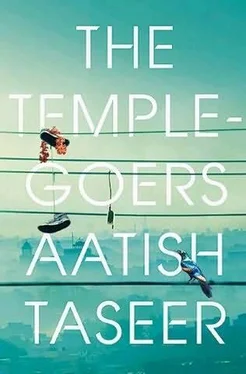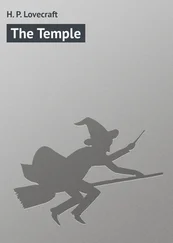‘I entered Lodhi Gardens through the park’s old entrance. Its British name, Lady Willingdon Gardens, was engraved on stone pillars flanking the locked iron gate. An unsteady, bright green turnstile had been installed next to it. White cars belonging to politicians, with red sirens and black cat commandos, were parked boldly outside where some variety of municipal work was forever under way. To enter the park, I had to sidestep thin ladies in bright colours, carrying shallow dishes of cement to and from a mound of mud half-filled with water, and men, despite the cold, in fraying vests, digging soft earth out of the pavement.
‘A path of concrete discs led down an avenue of white-trunked palms. On the left, the rough, red, crenellated walls of a tomb ran along a strip of clumpy grass. The tombs were bare, scarred and not beautiful, but faultless as ornaments for a park. One emerged now, with the remains of glazed turquoise tiles hanging like dead skin from its rough surface, evoking a Turkic memory deep within the Indian plain.
‘There were new faces in Lodhi Gardens, less serious walkers whom the summer heat had kept away. Among the usual women in salwar kurtas and sneakers, couples canoodling under trees and idle youth walking hand in hand, there were tourists crossing the paths of fast walkers, social ladies in velvety tracksuits and Delhi queens.
‘My walk was just beginning to gather pace, when passing one of the darker peripheries of the park, I noticed a slender young man watching me. I was struck by the fineness of his features and, despite his obvious poverty, his vanity and attention to style. He wore flared jeans and a close-fitting off-white shirt. He smiled first, not a bitter, gay smile, but a dark, malevolent smile. I returned it with a macho smirk saved only for bold advances from unlikely people. This seemed to register with the young man because he laughed out loud and approached in a dainty swagger. As he came out of the shadows, I marvelled at his physical beauty. His face had a Nepalese cast; he had dark smooth skin, a clean hairless neck and a small, precise mouth. His poverty though, was visible in his stained teeth and the murky whites of his light eyes.
‘As soon as he came near, I felt acute social embarrassment. Lodhi Gardens was full of fashionable people whom I knew, or knew a little, and I didn’t wish to be seen speaking to a man who was hardly better than a servant, especially a man as attractive as this one. He seemed to read my embarrassment and prolonged it. When I asked him for his telephone number, he responded with mock confusion: why would I want his telephone number?
‘ “Please, quickly,” I said, as if speaking to a servant. “I have to finish my walk.”
‘ “But first, tell me…”
‘ “Listen, I have to go. Do you have a mobile or not?”
‘The mention of that magic status symbol stopped the man’s playful delays. He whipped out his phone and held it insolently before me.
‘ “Give me your number,” he said.
‘I hurriedly gave him my number.
‘ “Name?”
‘ “Krishna,” I answered.’
Krishna! The moment I heard the name, though he went by Kris and not Krishna, I remembered where I had seen the creative writer. He also worked out at Junglee, but with Pradeep, the other trainer. He was a friend of Aakash’s top lawyer-client, Sparky Punj, and I had seen them many times, having a protein shake together after their workout. Aakash had taken an irrational dislike to him – linked no doubt to his choice of trainer – and called him Lul, literally dick, but more like limp dick.
‘He’s a gay!’ he would say every time Kris walked past, oblivious to Aakash’s hatred of him.
‘So what, Aakash?’
‘So what, Aakash?’ he would imitate in a girly voice and fall back into a sullen silence.
The thought of Aakash gave me a pang. I had hardly seen him since the night with the Begum of Sectorpur. He had cancelled trainings without notice, didn’t return missed calls and messages; he became moody at Junglee. His coldness, after the intimacy and excess of that day, affected me badly. I suspected that it was related to our episode with the begum. It was as if Aakash had rightly judged the unease it had left me with, but in a strange inversion, he pre-empted the possibility of my withdrawing by withdrawing himself. And in this way he had not only erased all discomfort I might have had from that day but also left me mourning his sudden absence in my life. I would find myself waiting for his text messages and phone calls. I’d reach for my phone first thing in the morning to see if something had come through. I thought up banal reasons to call him. If he didn’t show up at the gym, I wouldn’t work out, coming away feeling that not only had the hour been wasted but the day too. I cancelled plans made weeks in advance to see him, knowing full well that should something come up in his life, he would cancel me without a word. When I confronted him about his behaviour, he lied effortlessly. He had called, but my number was engaged; my text messages hadn’t reached him; his brother had borrowed his phone. If I questioned him further, he became upset and conversation shut down. His lying was also an aspect of his confidence, a supreme belief that even if the details of what he was saying were wrong, he couldn’t ever be wrong himself. His aloofness in that last week in Delhi put an added strain on my relationship with Sanyogita. She noticed that I was irritable and distracted and she sensed why. I couldn’t explain my exact condition because I didn’t fully understand it myself. I only knew that the euphoria I had felt on that Jet Airways flight back to Delhi, that cautious euphoria that reduced me to tears, had become tied up with Aakash and the world he opened up to me. But in the end, after many gestures of friendship, I’d stopped trying too; my last communication with him, to which I received no reply, had been a text message, reminding him of my departure and inviting him to Sanyogita’s party.
Caught up in these considerations, I found I’d missed some of the conversation in the creative writer’s story. The mention of his name drew me in again.
‘ “OK, Krishna,” the man said doubtfully. “I’ll give you a missed call.”
‘ “OK, OK,” I replied, in a voice that sounded as if I was instructing him to do some work for me, and moved on quickly. When I looked back, I saw that the man stood where he was and a smile played on his dark lips as he finished entering my number into his phone. He must have seen me because he looked up and waved his arm at me. “OK, Krishna. Remember me. I’m Jai. I’ll call you tonight.”
‘A few moments later, my phone vibrated in my pocket. I saved Jai’s number and carried on with my walk.
‘An assignation! I thought. I had made so many abroad, sometimes just walking past a man in the street: a suggestive look, a follow-up glance thrown over the shoulder a few paces later and an exchanged number. That was all. But now, despite being in my own country, exchanging numbers with another Indian, I felt on more unfamiliar ground than I had ever been on in the West, felt I couldn’t judge the man’s motives. This was what happened when everyone had a phone! It was amazing to think of the technology, available even to men like Jai, that brought us together and made possible the assignation, at once real but also indefinite and avoidable: the ingredients of anonymity.
‘I finished my rounds of the park. The winter brought clearer days and the sky, still blue on my first round and barnacled with scaly clouds, burned with scattered orange fires on my second. The subsequent rounds of the park, the dimness of evening and the drama of the second sky erased my memory of the encounter with Jai. I arrived back at my flat to tea and heaters. By the time I came out of the shower, a mild dusk had submitted to the curfew of a smoky night.
Читать дальше












